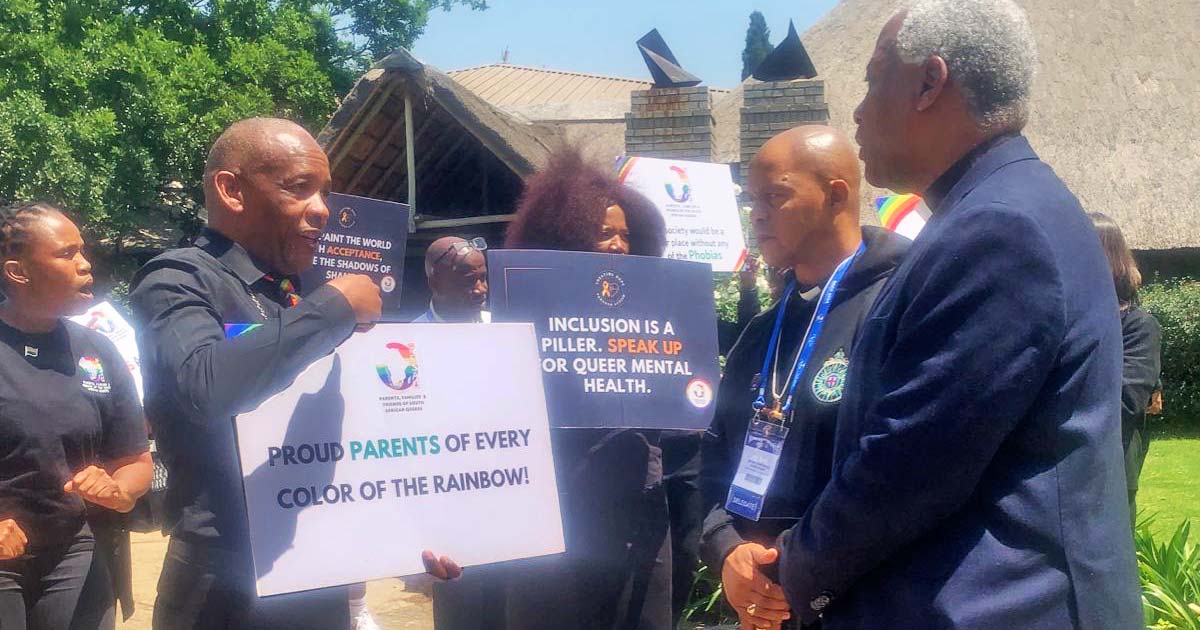Parents: SA Churches Must Act Against Anti-LGBTIQ+ Violence

The protestors expressed their sense of betrayal to Archbishop Thabo Makgoba (Photos and information courtesy of Rev. Teboho Klaas)
A group of parents, families of LGBTIQ+ individuals, and their children held a silent protest at the Triennial National Conference of the South African Council of Churches (SACC) on Thursday.
The protest aimed to draw attention to the failure of the council and its member churches to take a stand against the ongoing violence faced by the LGBTIQ+ community.
The protesters represented the organisations Lerato la Basadi and Parents, Families and Friends of South African Queers (PFSAQ), which were founded in 2013 in response to the surge of violent attacks on lesbian women in townships.
Despite a 2017 SACC resolution condemning violence against LGBTIQ+ people, the council has since remained largely silent on these atrocities and failed to take its promised actions, say the groups, who expressed a deep sense of betrayal.
Protest for Inclusion and Affirmation
Standing outside the conference centre, the protesters held placards calling for the inclusion and affirmation of queer children by their families and churches.
Archbishop Thabo Makgoba, the former SACC President, came out to engage with the group. Mrs. Thabisile Msezane of Lerato La Basadi expressed to him the deep pain experienced by families of LGBTIQ+ victims.
“We have travelled to provinces to bury lesbians. We buried burnt bodies because, to many, a lesbian is not seen as a human being. It’s a pain we cannot describe, but we ensure we are there for other parents facing the same tragedy,” she told the Archbishop.
The Rev. Mzwandile Molo, the General Secretary-elect of the SACC, also briefly met with the protesters. Ms. Zodwa Rannyadi of PFSAQ made it clear to him: “Our children do not want special treatment. All they want is to be accepted as human beings.”
Molo told the protestors that the SACC has no power to regulate its member churches and can only “continue to have that conversation with ourselves to try to help each other come to a place of common understanding on these matters.” He added that, “issues of justice will always be raised, and violence is not going to be tolerated by any of us” and promised to reach out to the LGBTIQ+ groups for further engagement.
As we recently reported, at least 13 LGBTIQ+ South Africans have been brutally murdered this year. (We are aware of two additional victims in the Eastern Cape, although details remain unconfirmed.)

SACC’s Lack of Action on Anti-LGBTIQ+ Violence
The SACC has long been known for its role in resisting apartheid and championing justice in South Africa. Its triennial conference, which brings together church leaders from 26-member churches and organisations, is a key platform for setting policies.
At its 2017 conference, the SACC passed a resolution encouraging dialogue with lesbian and gay Christians and their families. The council committed to celebrating sexuality as a gift from God and facilitating theological and pastoral consultations with member churches. However, LGBTIQ+ advocates argue that little action has been taken since then.
Rev. Teboho Klaas, a Religion Programme Officer with the Other Foundation and a pastor in one of the SACC’s member churches, supported the protest. “The SACC cannot pursue selective justice, leaving LGBTIQ+ people, their parents, and families out of the conversation. Selective justice is not justice at all,” Klaas remarked.
Rejection by the Anglican Church
This protest follows the Southern African Anglican Church’s recent decision to reject same-sex couples. On 26 September, the church’s Provincial Synod voted against allowing parish priests to bless same-sex couples and turned down a set of prayers intended to minister to those in civil unions.
In response to this rejection, supporters of the LGBTIQ+ community released the landmark Queer Kairos Document, modelled after the historic 1985 Kairos Document, which denounced the Church’s complicity in apartheid.
This new statement calls for the full inclusion and affirmation of LGBTIQ+ people in all aspects of religious life, urging religious institutions to confront their own prejudices and embrace justice and love for all people.

Leave a Reply